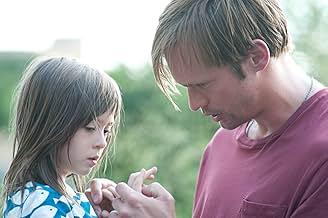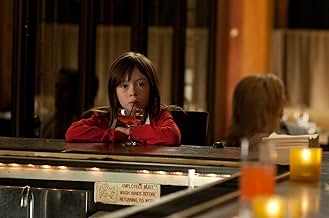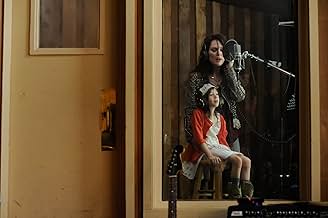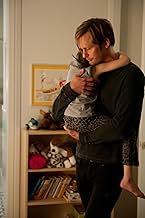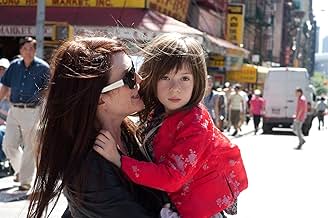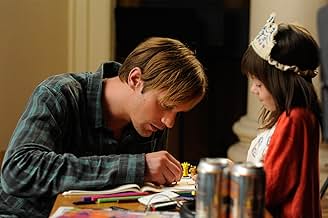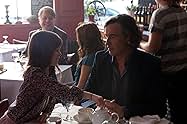IMDb-BEWERTUNG
7,4/10
29.034
IHRE BEWERTUNG
In New York City gerät ein junges Mädchen mitten in den erbitterten Sorgerechtsstreit ihrer Eltern.In New York City gerät ein junges Mädchen mitten in den erbitterten Sorgerechtsstreit ihrer Eltern.In New York City gerät ein junges Mädchen mitten in den erbitterten Sorgerechtsstreit ihrer Eltern.
- Regie
- Drehbuch
- Hauptbesetzung
- Auszeichnungen
- 3 Gewinne & 8 Nominierungen insgesamt
Jesse Stone Spadaccini
- Martin
- (as Jesse Spadaccini)
Diana García
- Cecelia
- (as Diana Garcia Soto)
Empfohlene Bewertungen
I've read five previously posted reviews of this film and see no reason to repeat what they've already said. I agree, for the most part, with the positive ones. And I suspect the negative ones were written by people whose established taste in movies should have steered them away from seeing this one in the first place.
What I'll add is, I guess, a mostly personal perspective. I've found that I am lately much more drawn to smaller, more deeply felt movies than to bigger, slicker, higher-production-value ones. To "What Maisie Knew," for example, than to "The Great Gatsby." Even though both source novels share a similar interior aesthetic, the treatment in the former stays inside the characters, where James focused the original (thus causing one of the previous reviewers' comments to the effect that "nothing happens" in the movie), while the latter (possibly because of Luhrmann's well-established directorial predilections)stays resolutely focused on the exterior spectacle and barely skims the surface of Fitzgerald's deeply rendered characterizations.
If you like smaller, more closely observed and deeply felt films, you'll like this one.
What I'll add is, I guess, a mostly personal perspective. I've found that I am lately much more drawn to smaller, more deeply felt movies than to bigger, slicker, higher-production-value ones. To "What Maisie Knew," for example, than to "The Great Gatsby." Even though both source novels share a similar interior aesthetic, the treatment in the former stays inside the characters, where James focused the original (thus causing one of the previous reviewers' comments to the effect that "nothing happens" in the movie), while the latter (possibly because of Luhrmann's well-established directorial predilections)stays resolutely focused on the exterior spectacle and barely skims the surface of Fitzgerald's deeply rendered characterizations.
If you like smaller, more closely observed and deeply felt films, you'll like this one.
10kcfl-1
This is what I hope Henry James would have written, were he alive today. The book is tough sledding, late James when he was dictating his novels (due to tendinitis), and there was no holding him back. At least one Harvard professor called him "the greatest American novelist," but this work is deservedly minor.
The movie was perfect, in the top 1% of all I've seen. The style was the antithesis of James, radical "showing" instead of "telling."
I think the title should have been "What Maisie SAW," but that's too titillating. What she knew or felt only her future therapist will learn. We do have a hint though when her father throws her mother's flowers away, and M explains, "He was allergic."
The movie was perfect, in the top 1% of all I've seen. The style was the antithesis of James, radical "showing" instead of "telling."
I think the title should have been "What Maisie SAW," but that's too titillating. What she knew or felt only her future therapist will learn. We do have a hint though when her father throws her mother's flowers away, and M explains, "He was allergic."
What Maisie Knew (2012)
*** 1/2 (out of 4)
Excellent updating of the Henry James story about a divorcing couple (Julianne Moore, Steve Coogan) and the impact that their behavior has on their young daughter Maisie (Onata Aprile) as well as the new step parents (Alexander Skarsgard, Joanna Vanderham). WHAT MAISIE KNEW isn't going to appeal to a mass audience but it's certainly a terrific little gem from directors Scott McGehee and David Siegel. What I enjoyed the most was the unique way it told the story. We never get the "full" story of everything going on but instead we get the bits and pieces that a child would remember about something. Instead of finding out why a parent leaves her at school, we just see how the child remembers being left alone. Instead of knowing what the parents are fighting about, we see how it impacts the child and her memories of it. This is a very unique way to tell the story and it gives a touch of freshness to a storyline (divorce) that we've seen before. It also doesn't hurt that the film doesn't shy away from some rather ugly behavior from the parents and especially the Moore character. To say she's an unworthy mother would be an understatement but I appreciate the film playing things straight and not ever trying to make something cute. It also doesn't hurt that we get some of the best performances that you're going to see all year with Moore doing an excellent job in her role as the busy mother who doesn't have enough time for her daughter. This is a rather ugly role so it was brave for the actress to take it on. The same with Coogan who also plays a jerk and delivers with some strong work. Both Skarsgard and Vanderham really steal the film in the roles of the step parents who find themselves being forced to deal with something they never expected. Both of them should be remembered at Oscar time but we'll see how that goes. The same is true for Aprile who doesn't get too much dialogue but we constantly see her reactions to the things going on around here. This is such an excellent and quiet performance and something you'd see in a silent movie. WHAT MAISIE KNEW is about a pretty ugly subject matter but it's a fascinating look at it for those who enjoy great performances and a unique story.
*** 1/2 (out of 4)
Excellent updating of the Henry James story about a divorcing couple (Julianne Moore, Steve Coogan) and the impact that their behavior has on their young daughter Maisie (Onata Aprile) as well as the new step parents (Alexander Skarsgard, Joanna Vanderham). WHAT MAISIE KNEW isn't going to appeal to a mass audience but it's certainly a terrific little gem from directors Scott McGehee and David Siegel. What I enjoyed the most was the unique way it told the story. We never get the "full" story of everything going on but instead we get the bits and pieces that a child would remember about something. Instead of finding out why a parent leaves her at school, we just see how the child remembers being left alone. Instead of knowing what the parents are fighting about, we see how it impacts the child and her memories of it. This is a very unique way to tell the story and it gives a touch of freshness to a storyline (divorce) that we've seen before. It also doesn't hurt that the film doesn't shy away from some rather ugly behavior from the parents and especially the Moore character. To say she's an unworthy mother would be an understatement but I appreciate the film playing things straight and not ever trying to make something cute. It also doesn't hurt that we get some of the best performances that you're going to see all year with Moore doing an excellent job in her role as the busy mother who doesn't have enough time for her daughter. This is a rather ugly role so it was brave for the actress to take it on. The same with Coogan who also plays a jerk and delivers with some strong work. Both Skarsgard and Vanderham really steal the film in the roles of the step parents who find themselves being forced to deal with something they never expected. Both of them should be remembered at Oscar time but we'll see how that goes. The same is true for Aprile who doesn't get too much dialogue but we constantly see her reactions to the things going on around here. This is such an excellent and quiet performance and something you'd see in a silent movie. WHAT MAISIE KNEW is about a pretty ugly subject matter but it's a fascinating look at it for those who enjoy great performances and a unique story.
What Maisie Knew (2012)
A truly remarkable movie, filled with great acting, masterful editing and filming, and terrific writing. The basis of it all is the core here, a glimmering Henry James novel by the same title from over 100 years earlier. It's amazing how well the story holds up set in contemporary times, and changed in many necessary (and interesting) ways. What it keeps it going is the basic heartbreaking drama of a child tossed between two indifferent parents.
The mother might be seen as the main actor here, Julianne Moore, and this is the best I've ever seen her, I think. She gives a slightly fiery performance, and "slightly" is perfect, avoiding an overacting job suggested by her role as a slightly successful rock and roll star. She's terrifically awful and you come to hate her, appropriately.
The father (Steve Coogan) also puts in a sharp performance playing the lively, fun parent who is a selfish womanizer, hiding, sometimes, his flaws from his daughter. His relationship with the mother is not detailed very far because it is mostly one of distance and disdain. And mutual abuse.
The real star here is the girl, an utterly charming and beautifully effective actress, Onata, Aprile. She succeeds not by her delivery of great lines, but by her expressions. It's all because Henry James understood something delicate about children in these situations: they know what's going on and don't say it. And they also don't let it affect them because they simply can't afford to, or because they become hardened in some little ways, making them withdraw or act out. That Maisie maintains a delicious sweetness without playing the victim is quite remarkable, and Aprile is brilliant.
The secondary woman and man in the story are also terrific, and their roles grow as the movie grows. In fact, they become the sympathetic heart of things.
Pulling this together is the directing pair, McGehee and Siegel. This is their fifth movie together, and neither man has directed anything without the other. I've not seen any of the other four, but the reviews are middling to poor for all of them, so I'm not sure how far the novelty takes us. But it works here perfectly, making the complexity unfold quickly and coherently.
It's an ordinary drama on the surface, but let this one sink in over time. It's that good.
A truly remarkable movie, filled with great acting, masterful editing and filming, and terrific writing. The basis of it all is the core here, a glimmering Henry James novel by the same title from over 100 years earlier. It's amazing how well the story holds up set in contemporary times, and changed in many necessary (and interesting) ways. What it keeps it going is the basic heartbreaking drama of a child tossed between two indifferent parents.
The mother might be seen as the main actor here, Julianne Moore, and this is the best I've ever seen her, I think. She gives a slightly fiery performance, and "slightly" is perfect, avoiding an overacting job suggested by her role as a slightly successful rock and roll star. She's terrifically awful and you come to hate her, appropriately.
The father (Steve Coogan) also puts in a sharp performance playing the lively, fun parent who is a selfish womanizer, hiding, sometimes, his flaws from his daughter. His relationship with the mother is not detailed very far because it is mostly one of distance and disdain. And mutual abuse.
The real star here is the girl, an utterly charming and beautifully effective actress, Onata, Aprile. She succeeds not by her delivery of great lines, but by her expressions. It's all because Henry James understood something delicate about children in these situations: they know what's going on and don't say it. And they also don't let it affect them because they simply can't afford to, or because they become hardened in some little ways, making them withdraw or act out. That Maisie maintains a delicious sweetness without playing the victim is quite remarkable, and Aprile is brilliant.
The secondary woman and man in the story are also terrific, and their roles grow as the movie grows. In fact, they become the sympathetic heart of things.
Pulling this together is the directing pair, McGehee and Siegel. This is their fifth movie together, and neither man has directed anything without the other. I've not seen any of the other four, but the reviews are middling to poor for all of them, so I'm not sure how far the novelty takes us. But it works here perfectly, making the complexity unfold quickly and coherently.
It's an ordinary drama on the surface, but let this one sink in over time. It's that good.
Greetings again from the darkness. An ultra-modern update of the 1897 Henry James novel introduces us to parents we know, but wish we didn't. Steve Coogan plays Beale, a self-absorbed art dealer. Julianne Moore plays Susanna, a self-absorbed rock star. OK, you and I may not know art dealers and rock stars, but we know self-absorbed types and we know they make terrible parents. So not only do we know it, but it's also what Maisie knows.
Five outstanding performances and strong work by co-directors Scott McGhee and David Siegel prevent this one from spinning off into the neverlands of melodramatic muck. Onata Aprile is a wonder as Maisie. She displays none of the typical "movie kid" precociousness. The movie (and James novel) are told from her point of view. We see the fragmented bits and pieces she experiences as her parents fight. Rather than a full story, we share her moments of late pick-ups, early drop-offs and forgotten trips.
Soon enough Beale and Susanna are divorced and the real wars begin. These despicable adults make little effort in hiding their hatred of each other from 6 year old Maisie. It becomes background noise to her life. Further proof of the epic narcissism from both, Beale soon marries Margot the nanny (played by Joanna Vanderham) and Susanna reacts by marrying Lincoln, a band gopher and bartender played by studly Alexander Skarsgard. The most startling moment of the movie occurs when Lincoln first begins playing with Maisie ... it's as if we had almost forgotten what it means to give your attention to a child.
This is not an easy film to watch ... at least if you understand that parenting means putting yourself second. The directors do a wonderful job of showing us how Maisie takes in moments and what memories she makes from these. The neglect and false moments of caring from her parents make her acceptance of the attention to her step-parents even more poignant. We can't help but hope things work out for this little girl and it's a reminder that childhood innocence cannot be recaptured once lost ... and it's worth hanging on to for as long as possible.
Five outstanding performances and strong work by co-directors Scott McGhee and David Siegel prevent this one from spinning off into the neverlands of melodramatic muck. Onata Aprile is a wonder as Maisie. She displays none of the typical "movie kid" precociousness. The movie (and James novel) are told from her point of view. We see the fragmented bits and pieces she experiences as her parents fight. Rather than a full story, we share her moments of late pick-ups, early drop-offs and forgotten trips.
Soon enough Beale and Susanna are divorced and the real wars begin. These despicable adults make little effort in hiding their hatred of each other from 6 year old Maisie. It becomes background noise to her life. Further proof of the epic narcissism from both, Beale soon marries Margot the nanny (played by Joanna Vanderham) and Susanna reacts by marrying Lincoln, a band gopher and bartender played by studly Alexander Skarsgard. The most startling moment of the movie occurs when Lincoln first begins playing with Maisie ... it's as if we had almost forgotten what it means to give your attention to a child.
This is not an easy film to watch ... at least if you understand that parenting means putting yourself second. The directors do a wonderful job of showing us how Maisie takes in moments and what memories she makes from these. The neglect and false moments of caring from her parents make her acceptance of the attention to her step-parents even more poignant. We can't help but hope things work out for this little girl and it's a reminder that childhood innocence cannot be recaptured once lost ... and it's worth hanging on to for as long as possible.
Wusstest du schon
- WissenswertesIn an interview on the NPR program "Fresh Air", Julianne Moore said that she drew on Courtney Love and Patti Smith for inspiration for her character in this movie, who is (like Love and Smith) a rock star who is also a mother.
- VerbindungenFeatured in At the Movies: Folge #10.26 (2013)
- SoundtracksRockabye Baby
Performed by Julianne Moore
Top-Auswahl
Melde dich zum Bewerten an und greife auf die Watchlist für personalisierte Empfehlungen zu.
Details
- Erscheinungsdatum
- Herkunftsland
- Offizielle Standorte
- Sprache
- Auch bekannt als
- What Maisie Knew
- Drehorte
- The High Line, Manhattan, New York City, New York, USA(Maisie and Lincoln play at the High Line)
- Produktionsfirmen
- Weitere beteiligte Unternehmen bei IMDbPro anzeigen
Box Office
- Budget
- 6.000.000 $ (geschätzt)
- Bruttoertrag in den USA und Kanada
- 1.066.471 $
- Eröffnungswochenende in den USA und in Kanada
- 21.480 $
- 5. Mai 2013
- Weltweiter Bruttoertrag
- 2.711.379 $
- Laufzeit1 Stunde 39 Minuten
- Farbe
- Sound-Mix
- Seitenverhältnis
- 2.35 : 1
Zu dieser Seite beitragen
Bearbeitung vorschlagen oder fehlenden Inhalt hinzufügen

Oberste Lücke
By what name was Das Glück der großen Dinge (2012) officially released in India in English?
Antwort






